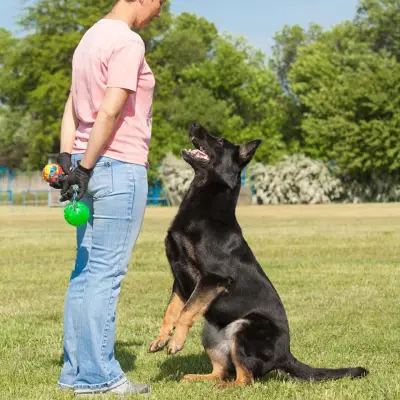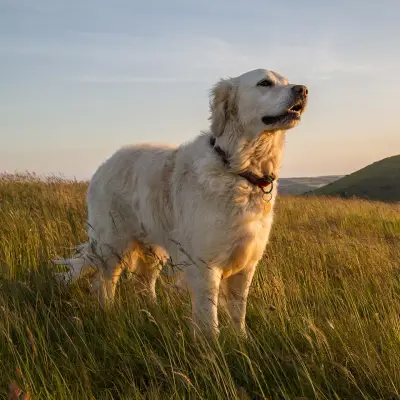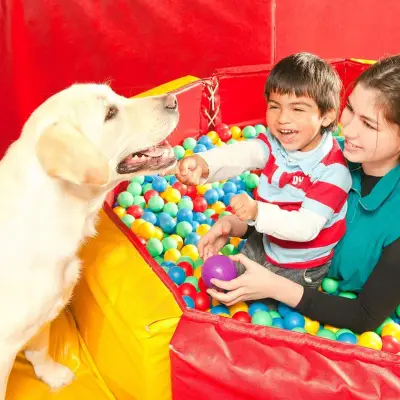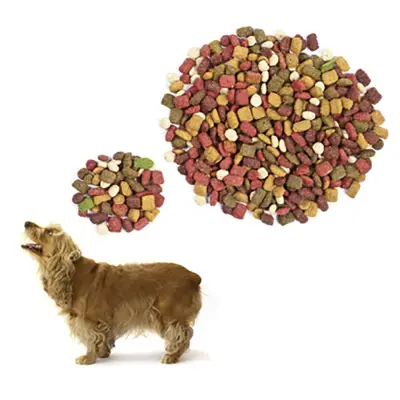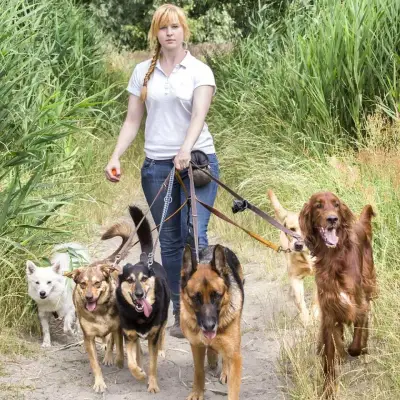If you’ve come across unexpected holes in the garden, torn-up patches of carpet, or your dog enthusiastically scratching at the sofa cushions, it’s likely they’ve developed a digging habit. While common, this behaviour can quickly become frustrating, especially when it leaves your flowerbeds in disarray and your furniture looking worse for wear.
Many dog owners come looking for advice on how to stop a dog from digging, whether it’s outdoors in the garden or indoors on beds, sofas, and carpets. This guide offers a practical, straightforward look at what’s going on and how to gently and effectively manage it.
Jump to:
Recommended for you!
Best SellersWhy Do Dogs Dig?
Dogs dig for a variety of reasons, and the cause can often explain the location. A dog digging in the garden may be seeking comfort or chasing a scent, while a dog digging the sofa or carpet is often driven by nesting instinct, boredom or anxiety. Some common reasons include:
- Natural instinct (especially in terrier breeds)
- Boredom or under-stimulation
- Trying to hide food or toys
- Seeking comfort—cool soil or soft bedding
- Stress, anxiety or frustration
- Attention-seeking
- Playfulness in puppies
How to Stop a Dog from Digging: A Step-by-Step Approach
Step 1: Identify the Trigger
The first step in stopping your dog from digging is figuring out the root cause. Are they digging in soft soil to cool off? Ripping up the carpet before bedtime? Digging under the fence to escape? Try to observe when and where it happens.
For instance, if your dog starts digging in the garden after being left alone for a while, boredom or separation anxiety may be the cause. If it’s only on the sofa or bed before sleep, it could be nesting behaviour.
Step 2: Increase Mental and Physical Stimulation
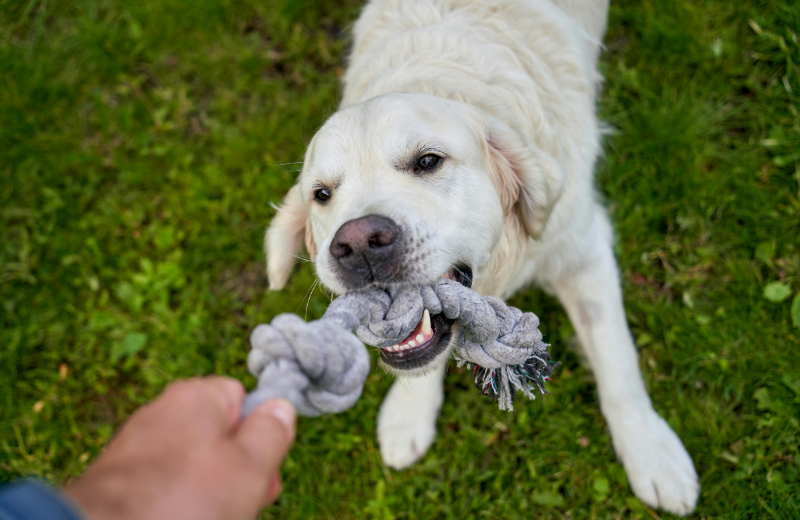
Most digging problems stem from boredom or a lack of enrichment. Dogs are intelligent, active animals and need daily stimulation. A tired dog is far less likely to start digging holes in the garden or scratching your sofa for entertainment.
Try:
- Longer walks or varied routes
- Playing fetch, tug-of-war or hide-and-seek
- Introducing puzzle feeders and scent games
- Training sessions using positive reinforcement
This is especially important if you want to stop a puppy from digging, as young dogs are bursting with energy and need appropriate outlets.
Step 3: Create Safe Alternatives
Instead of trying to stop a dog from digging completely, consider giving them an appropriate place to dig. This taps into their natural instinct in a controlled way.
Ideas include:
- A digging box filled with soil or sand
- A corner of the garden where digging is allowed
- Burying toys or treats in this area to encourage use
This is particularly useful for stopping a dog from digging in the garden without taking all the fun away. It gives your dog permission to behave naturally, but in a place that doesn’t destroy your plants or paths. Make sure to reward your dog whenever they use this zone, so they associate it with praise and fun.
Step 4: Manage the Environment

If your dog is digging in specific spots—say, by the fence, in the flowerbeds, or behind the sofa—there are ways to make those places less appealing or accessible.
For the garden:
- Lay chicken wire just beneath the soil in flowerbeds
- Use paving stones or heavy planters to block key digging spots
- Supervise outdoor time, especially if the dog is prone to digging under fences
For inside the home:
- Provide a soft, designated bed with blankets they can arrange
- Keep favourite toys nearby
- Use furniture covers or discourage access to sofas during the learning phase
If you want to stop a dog from digging under a fence, burying mesh wire or installing a barrier at the base can be very effective. Consistent supervision and redirection in these areas also helps reinforce boundaries.
Step 5: Use Scent-Based Deterrents (with Caution)
Certain smells can be effective in keeping a dog from digging. Dogs have powerful noses and can be discouraged by certain scents. While not foolproof, you could try:
- Citrus peels in the garden beds
- Coffee grounds sprinkled in digging spots
- A diluted vinegar spray (used carefully, as it may harm plants)
- Commercial ‘no-dig’ sprays designed for pets
Bear in mind that results vary. One dog might hate lemon, while another won’t even notice it. Always test a small area first, especially indoors.
Step 6: Teach and Redirect
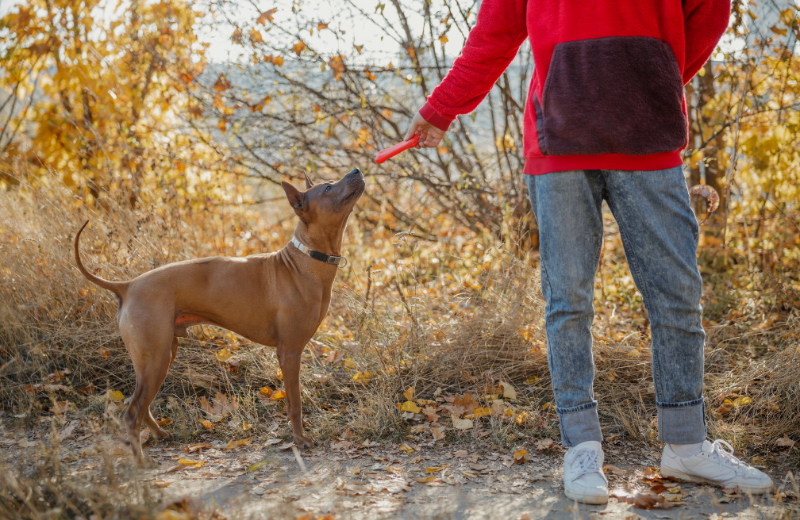
If your dog starts to dig, calmly interrupt them. Avoid shouting or punishment, as this only increases anxiety. Instead, say something like “Leave it”, then redirect them to a toy, a digging-safe area, or initiate a different activity.
Over time, your dog will learn that digging in the wrong place gets them nowhere, while calm behaviour earns rewards.
For example, if your dog is digging at the carpet, a chew toy nearby can shift their focus. If they’re digging on the bed, guide them to their own bedding with a treat or comforting routine.
Step 7: Address Underlying Stress or Anxiety
If your dog is digging obsessively, chewing, pacing or showing signs of distress, anxiety may be the cause. This can come from:
- Being left alone too long
- Sudden changes in the environment
- Loud noises or fear triggers
Soothing techniques include:
- Leaving background music on
- Using calming sprays or pheromone diffusers
- Ensuring a secure, quiet sleeping area
- Consistent routines for walks, feeding and rest
If you suspect your dog has anxiety and want to learn how to support them, our Canine Anxiety Diploma Course (just £29) is a great place to begin.
Recommended for you!
Best SellersCommon Questions About Stopping Digging
Do dogs grow out of digging?
Some do grow out of digging, especially as puppies mature and settle. But even older dogs may dig if the cause isn’t addressed, so don’t rely solely on age to fix the problem.
What can I put in my dog’s hole to stop digging?
You can fill the hole with soil and their own droppings or citrus peels—many dogs avoid returning after that. Pairing this with training and supervision is the best way to stop repeat digging.
What powder stops dogs from digging?
There are commercial digging repellents in powder form, but their effectiveness can vary. Always check that the product is safe for pets, and don’t depend on it as your only method.
Do coffee grounds stop dogs from digging?
Many dogs dislike the smell, making coffee grounds a natural deterrent when sprinkled in digging areas. Be sure your dog doesn’t ingest them, as caffeine can be harmful.
Will my dog ever stop digging?
Yes, but not overnight. With patience, consistency and the right support, most dogs can learn to dig only in appropriate places—or stop entirely, especially when their emotional and physical needs are met.
Study Our Dog Training Diploma for £29
If you're ready to deepen your understanding and become a confident, knowledgeable trainer, consider taking the Dog Training Diploma Course with Centre of Excellence. Whether you're a dog owner, aspiring trainer, or simply passionate about canine behaviour, this course offers comprehensive guidance suitable for all levels. And right now, you can enrol for just £29.



